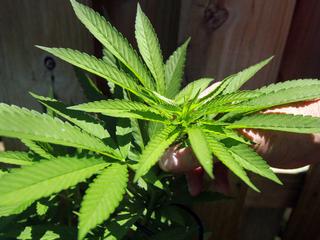Residents Split from City, Police on Legal Pot

Friday, October 31 2014
Unalaska’s city council made a rare move in October when they passed a resolution urging residents to vote against a statewide ballot measure -- proposition two, which would regulate marijuana like alcohol in Alaska. But as KUCB's Annie Ropeik reports, some residents say council’s decision doesn’t speak for them.
Unalaska’s resolution was based on ones passed in Haines and Ketchikan earlier this fall. Ketchikan’s meeting to pick a side on legalization was well-attended, according to local radio station KRBD.
But in Unalaska, councilors only heard from police Sgt. Bill Simms. His department drafted the resolution, which said legal marijuana would create more crime, health and work safety issues in town. At the meeting, Simms backed that up with statistics on the dangers of legalization in other states.
Only one city councilor felt they hadn’t gotten a balanced picture. Tom Enlow said he’s personally opposed to legalization -- but felt it wasn’t his place to impose that on constituents.
"If you want to come up to me personally after the meeting and ask me, I’ll tell you where I stand on it," he said. "But what I’m going to encourage every voter to do, all the time, is to get informed and make the decision on your own."
The rest of the council voted for the resolution, though, and that rankled residents like Christina Henley. She’s lived in Unalaska with her kids for four years, working as a gatehouse supervisor at Horizon Lines. She says she wished she’d found out council would be covering marijuana before the meeting.
"Public safety, city council -- it’s not the city council’s job to urge anybody to vote," she says. "Their jobs are to keep the public safe, manage the budget and let the voters make their own decision."
And Henley thinks they should decide to legalize the drug. She says she doesn’t smoke marijuana. But she has spent time in prison for drug use -- LSD, she says, in the late ‘90s. Since she's "been in the system," she says she thinks the state puts too much time and money into policing marijuana.
"When you’re locked up, and you’re a big drug dealer, and you see little tiny marijuana people, it’s almost like a joke," she says. "Everybody knows it’s weed. It’s not the same -- in my opinion, weed’s safer than tobacco and alcohol."
But police Sgt. Simms told city council that Unalaskans aren’t being jailed for possession alone. Of the 40 people charged with marijuana misdemeanors here in the past five years, he said more than half had also committed ”more serious crimes: such as DUI, assault, disorderly conduct, weapons offenses, criminal trespass and bench warrants." He said the most arrests were related to driving under the influence.
Henley argues that illegal marijuana use and distribution isn’t going away in Unalaska. She says regulating the drug and taking it out of the hands of dealers would make everyone’s lives safer and easier.
"I’d be excited if I was a police officer," she said. "Instead of taking these little, petty, 30-day crimes, let’s focus on catching those big guys. Let’s put that revenue, that cost -- let’s put that into undercover operations to get that heroin out of here, to keep getting that meth out of here."
Those substances are on the rise in the city -- police have made several major methamphetamine and black tar heroin busts in the past year. And they say marijuana use often leads to using and distributing those harder drugs.
Local bartender Danielle Williams disagrees. She’s another advocate of measure two, and says she’s watched hard drug and alcohol use destroy lives in Unalaska, but never marijuana. In fact, she says most people using it here aren’t what she’d call criminals.
"If there wasn’t such a stigma on weed, more people would come out and say that they use it," she said. "And it would be more normal people, like, the upstanding citizens of the community."
In the past, Unalaskans have gone back and forth on the idea of regulating marijuana like alcohol. Fifty-one percent of voters said ‘no’ to a legalization initiative in 2000. Four years later, turnout was a little higher, and the margin was flipped -- 51 percent said ‘yes.’
Both those measures failed statewide. But this time, Unalaskans like Williams and Henley think the tide’s turned in marijuana’s favor. They say city officials should think about tax revenues and other local priorities before they oppose it.
With the election just days away, they and other residents have taken to social media, urging others to vote ‘yes,’ too.



